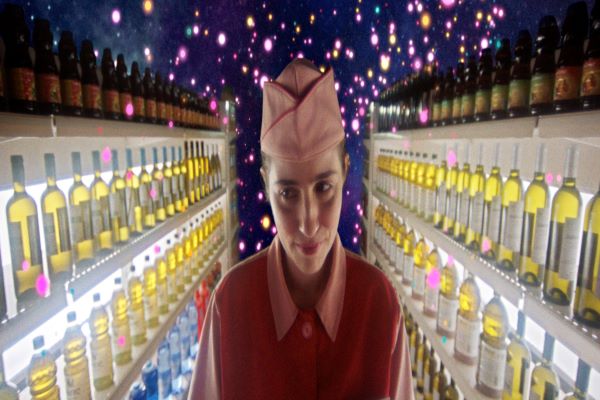For Anna, there is one constant in her life – the titular Cosmic Candy, a popping candy confectionery which offers a calming relief. Her neighbours are boorish and her colleagues mindless, but the crux of her issues finds Anna stuck in an endless, dreamy loop where she holds tightly to her emotional baggage, with issues around moving on and forging relationships. Despite the fantasy aesthetic, and the film’s opening, it categorically falls more into an exaggerated reality, verging into melodrama. Refraining from tooth-rooting sweetness, Rinio Dragaski’s directorial debut attempts to utilise this spoonful of sugar to accentuate her narrative style but leaves behind a few too many cavities to truly succeed.
Many of the film’s subplots and side-narratives are two-dimensional afterthoughts, where preference should be to offer the relationship between Anna and Persa as much time as possible in the quasi-road-trip meets babysitting adventure. A comedy at heart, it has a distinct visual style and Grecian humour, capitalising on misery and persistent light-hearted sadism.
This relationship holds the frayed, sugary, film together, and thankfully the pair achieve chemistry which holds attention – but it is not all sunshine and day-glow radiance. It takes time, which does reflect the steady building of the pair’s camaraderie, but it makes for slow viewing as Anna takes in young neighbour Persa (following her dad’s disappearance) who for a chunk of the film’s opening outstretches the tolerable range of irritating.
In reality, this is precisely how we are meant to view the character and can be chalked up to Evi Dovelou‘s brilliant performance as the young neighbour, who by the conclusion has aided Anna in her emergence as a flawed being, but a profoundly more comfortable and stable person. The pairing adds to the film’s needed levity, with Dragaski’s writing surprisingly multifaceted and offering plenty for the pair to work with and develop on.
Though the structure of the film does slip on occasion from delightfully capricious into a sense of annoying incontinence, the one constant is Maria Kitsou, who throughout the film captures the essence of Dragaski’s intention of surrounding this one person with all of life’s relatable baggage and fuelling her with bizarre, lucid dream-states. Kitsou has a wide emotional range, and the pace at which she flips from passive to a bursting eruption of frustration is daunting and impressive.
The film’s principal dip into the realms of wacky and weird exposes itself at Anna’s breaking point, her relationships non-existent, and her dignity shattered and choices questioned. Anna is visited by a large, luminous being – the mascot of Cosmic Candy. Designed spectacularly, the short sequence features a blend of artistic and prosthetic effects which don’t feel out of place, even as Pinelopi Valti turns the dial to 11 in showcasing their creative ability and propels the film’s sound and colour palette into an interstellar state of surreal awakening. Manipulating a synthesised Clair De Lune, Yannis Veslemes concocts a rather intoxicating score which maintains the surreal nature of the film, even when it finds footing in reality.
An illuminating outing for writer and director Dragaski, Cosmic Candy strays from the confines of safety, demonstrating the filmmaker’s ambitious ability to fuse illustrated fantasy with the doldrums of everyday life. With a vibrant visual style, even in the day-to-day pops of colour to stand out against the dusted greys, Cosmic Candy is a compelling look at the crippling weight of denial, and the implications of blaming others for your insecurities.
Screened as part of Fantasia Festival
